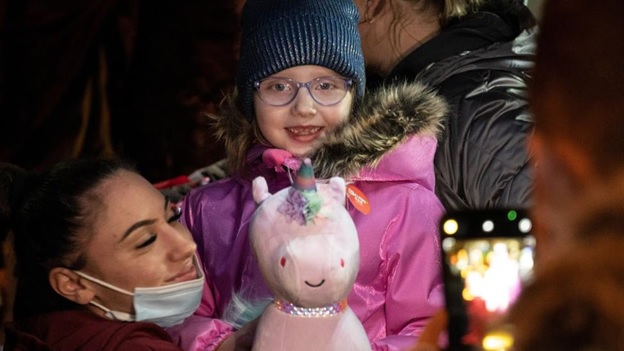
By Barbie Latza Nadeau
ROME—The queue outside the Baobob refugee soup kitchen in central Rome is filled with desperate migrants and refugees every single day of the week. In recent months, most are from Afghanistan and war-torn African nations like Somalia, Sudan and the Tigray region of Ethiopia. There aren’t any Ukrainian war refugees standing in the cold, though. They have been welcomed into warm homes and care facilities. “They are white, so they get special treatment,” a man from Afghanistan who worked as a translator for Italian peacekeepers in Afghanistan before the Taliban regained control over the country told The Daily Beast as he crouched beside the tent nearby where he sleeps. “But the worst part is that people who used to give spare clothes and food to us are now giving them to Ukrainians.”

The man doesn’t want his name published out of fear it will negatively impact his asylum request, which he launched more than a year ago. He and thousands of other war refugees in Italy are stuck in bureaucratic limbo that can take two or three years before they learn if they can legally stay even when they are countries that have suffered longer wars than the four-week invasion of Ukraine whose refugees do not have to go through the same process—even though they are not part of the European Union. Ukrainian refugees are automatically granted a right to stay for 90 days—no questions asked. If they want to extend the stay, they can apply for a 90-day extension.
While no one disagrees that Ukrainians need assistance and support as their country is besieged in this unfair war, there is a growing sense of a double standard when it comes to the color of refugees’ skin and their treatment. Andrea Costa, who runs the Baobab center in Rome, told The Daily Beast that while he agrees wholeheartedly that the Ukrainian refugees need help, so do the African and Middle Eastern refugees. And he sees hypocrisy in calling those helping Ukrainians “saviors” while those who save African refugees are often prosecuted for people smuggling, referring to a number of NGO rescue boat captains currently facing charges in Italy for rescuing migrants and refugees. “It is not acceptable to call the people accepting women and children on the border between Ukraine and Poland heroes, but to call those who help people shipwrecked in the Mediterranean sea criminals,” he says. “Wars are all the same. Refugees are all the same.”
The discrepancy between “types” of refugees was made crystal clear in the days after Vladimir Putin invaded Ukraine. Thousands of Africans who were working and studying in Ukraine were stopped at the Polish border while white Ukrainians were quickly ushered through, according to Human Rights Watch. “It’s a harrowing situation for everyone trying to get out of harm’s way, and everyone escaping the war, no matter where they come from, should be allowed to leave,” Judith Sunderland, associate Europe and Central Asia director at Human Rights Watch says. “Ukrainian authorities should not discriminate based on nationality or race, and neighboring countries should allow everyone in with a minimum of bureaucracy.”
But that is not happening at Ukraine’s borders and tensions are rising in countries like Italy and Greece among the thousands of African refugees who wish they could get even a modicum of the good will being showered on Ukrainians. At the Santa Sofia Ukrainian Church in Rome, organizers have had to turn people who are delivering supplies including clothing and medicine away due to the outpouring of generosity. “We have told them to give the excess to other refugee groups in the city,” a church official told The Daily Beast. “We are overwhelmed with donations.” Meanwhile the Baobob center regularly publishes its list of needs: canned food, children’s clothing and shoes, diapers, and medicine.
World Health Organization chief Tedros Adhanom Ghebreyesus said Wednesday that he hopes the Ukrainian refugee crisis helps shift the view of war refugees in general, and highlight other areas where people are indiscriminately killed by oppressive regimes, including his own home country of Ethiopia. “Yes, I’m from Tigray. And this crisis affects me, my family and my friends very personally,” he said. “But as the director general of WHO, I have a duty to protect and promote health wherever it’s under threat. And there is nowhere on earth where the health of millions of people is more under threat than in Tigray. Just as we continue to call on Russia to make peace in Ukraine, so we continue to call on Ethiopia and Eritrea to end the blockade, the siege, and allow safe access for humanitarian supplies and workers to save lives.”
During the initial invasion of Ukraine, Human Rights Watch interviewed scores of people from Morocco, India, Nigeria, Uganda, and Tunisia in Lviv, Ukraine and again at the border with Poland. “Most people were interviewed in groups, all of whom confirmed having had the same or similar experiences,” the group said in early March.
Those experiences range from one woman from Sierra Leone being told “all Blacks must get off the bus” to being forcefully pulled out of queues of people waiting to cross into Poland, according to Human Rights Watch. Human Rights groups in Ukraine put out a joint statement calling on European nations not to hold up old biases against African and Middle Eastern refugees. “We call on all parties involved, both as regulators and on the ground, to counter any instances of personal or institutional discrimination, xenophobia or racism amidst this crisis, providing support to representatives of underrepresented or historically marginalised groups currently staying in Ukraine,” the group said.
Back in Italy at the food line, there is little belief that the Ukrainian situation will make any difference to how war refugees from elsewhere are received. “We would love to see such emotional and operational participation also in respect to other armed conflicts and to refugees who are equally worthy,” the Baobab group said in a Facebook post. “For the Afghans that we have abandoned to the violence of the Taliban regime, after twenty years of Italian occupation.
Or, for example, for the thousands of women, girls and children, victims of rape in the invisible war in Ethiopia, former Italian Colony. There is talk of genocide of Tigrian civilians and there is a humanitarian catastrophe that, evidently, does not raise empathy. Or maybe for the Yemenite population, devastated by 8 years of armed conflict, where there are hundreds of thousands of displaced people and 80% of which are women and children.”
Italy has allotted 13,000 places in refugee centers for Ukrainians. “We were wondering if there was a place to sleep even for Sudanese fleeing a civil war who has already seen the deaths of 300,000 people or for Afghans stranded from Europe on the border between Bosnia and Croatia. We asked ourselves if they deserve peace too. Beyond skin color, that’s it.” The Baobob group posted, noting that Italy set up a National Emergency Fund with €10 million to respond to the “serious crisis: The Ukraine one. Only the Ukrainian one.”
Source: The Daily Beast


